These a lot of money in professional sports. This article will examine some of the metrics by which baseball and football money is measured, from player salaries and the most valuable franchises to the high prices for some trading cards and sports memorabilia.
A good place to start might be to examine what are the most valuable sports franchises.
According to most reliable sources, including Investopedia, Forbes, and ESPN, the most valuable franchise in the world is the NFL's Dallas Cowboys, with a price tag of $9.2 billion.
Purchased by Jerry Jones in 1989 for an estimated $140 to $150 million, the Cowboys represent the epitome of sports marketing, from the flashy uniforms, to the presence and prestige of the Dallas Cowboy Cheerleaders, to the mammoth mecca of sporting luxury that is AT&T Stadium, the Cowboy brand exudes quality and excess.
Dallas Cowboys: $9.2 billion
With that list in mind, here are the top 10 baseball franchises:
New York Yankees, $7.1 billion
What's notable about all of these franchises is that financial value doesn't correlate with success on the field. It's almost as if the most elementary part of the equation - winning games and championships - doesn't really matter. Being at the top of the heap is more aligned with marketing and being in the proximity of a vibrant media market.
For example, while the Cowboys are the most valuable franchise in the world, they haven't won the Super Bowl since 1995, their third in four years (1992, 1993). Since then, they've been regulars in the playoffs, but they haven't even been to the Super Bowl or NFC Championship.
In this century, beginning in 2000, they didn't even reach the playoffs in 13 of 24 seasons. More than half the time, the Cowboys are off to play golf in January. In three consecutive seasons, from 2000-2002, they went 5-11, and after losing in the wild card round in 2003, went 6-10 and 9-7 in 2004 and 2005, missing the playoffs both years.
So, it's not winning a ton of trophies that keeps the fan base howling, it's loyalty, regional, national, and international marketing, and surely a good dose of down home business acumen that keeps the Cowboys strong and worth a ton of money.
Looking at the MLB top franchises, while the Yankees and Dodgers are winners of their respective divisions year in, year out, they've only won three World Series since 2000. The Yankees won in 2009 and 2009, with the Dodgers taking home the prize in 2020.
However, winning championships seems more aligned in baseball than in football. Since 2000, the Red Sox have won four World Series, the Cubs one, Giants two, Angels, Phillies, and Braves, one each and the Cardinals, two. The Mets reached twice and lost to the Yankees (2000) and the Royals (2015), so, at least there's some on-field success fueling the cash registers.
As far as the Mets are concerned, it pays to be in New York. The Royals, who won it all in 2015 and are knocking on the playoff door again in 2024, aren't going to get rich in the conservative Kansas City midwest.
Beyond the billions tied up in franchises, all teams need good players, and they need to pay well.
Just for jealous kicks, the list of highest paid football players according to the NFL. Though the length of the contracts vary, these numbers represent the average annual value.
1. Jordan Love, Packers, $55 million
One thing jumps right out at you from this list. All of those guys are quarterbacks, so, moms and dads, if you want your kid to provide a cushy retirement for you, better develop that arm strength and situational awareness early.
NFL salaries are so heavily tilted toward quarterbacks that the first player on the list that isn't one comes in at #19, Justin Jefferson, wide receiver for the Minnesota Vikings.
Differentiating from franchise values, on-field success really does matter when it comes to players. Nobody's going to make $40-50 million unless they've got an accurate arm and good leadership qualities. You might make a bunch of money for a while, but, a couple of bad years and that's it.
By the way, Patrick Mahomes, who does nothing but win championships, is just off the list, at $45 million.
In baseball, you guessed it, when they're not grasping a baseball, pitchers have their hands deep inside the owner's pockets.
According to Spotrec.com, these are the the top ten salaries, payroll, cash, earnings, contracts, and bonuses, of active MLB players.
1. Shohei Ohtani, Dodgers, $70 million
Six of the top ten are pitchers, if you include Ohtani, though he's not, so there's more parity in baseball than in the NFL.
From the looks of things, the Rangers, last year's World Series champs, got hosed, paying up for three of the top ten and they won't even make the playoffs this year.
While Ohtani is far and away the biggest money earner, the Dodgers better go deep into the playoffs and even win the World Series. That's how important the $70-large is. Ohtani isn't even pitching, though he could, so he can focus on hitting, which is probably a good move long term for both him and the team.
Aaron Judge looks like a bargain at $40 mil. The guy leads the world in just about everything and probably has another good seven to eight years in him, maybe more.
As far as the Angels are concerned, paying Mike Trout $37 million makes sense, but Anthony Hendon? In five seasons in LA, he's never appeared in more than 58 games (53 so far in 2024), only hit better than .240 once, in his first year on the coast, 2000 (.280), and in the five years as an Angel, he's hit a total of 22 home runs, including 0 this season.
Just wow!
For those of you who don't have lightning in your arm or can't run a 4.3 40, there's hope. You may find your baseball cards to have value, as shown in the sidebar.
Here's the list of the top 10 sports franchises and their estimated values, according to data provided by Sportico, via ESPN. All are U.S. based, with seven of them NFL teams. The Yankees are the only representative from MLB, and the second and seventh spot are occupied by NBA franchises, the Golden State Warriors and Los Angeles Lakers, respectively.
Golden State Warriors: $7.56 billion
New York Yankees: $7.13 billion
New York Giants: $7.04 billion
Los Angeles Rams: $6.94 billion
New England Patriots: $6.7 billion
New York Knicks: $6.5 billion
Los Angeles Lakers: $6.44 billion
San Francisco 49ers: $6.15 billion
New York Jets: $6.11 billion
Los Angeles Dodgers, $4.8 billion
Boston Red Sox, $4.5 billion
Chicago Cubs, $4.1 billion
San Francisco Giants, $3.7 billion
New York Mets, $2.9 billion
Los Angeles Angels, $2.7 billion
Atlanta Braves, $2.6 billion
Philadelphia Phillies, $2.575 billion
St. Louis Cardinals, $2.55 billion
1. Trevor Lawrence, Jaguars, $55 million
1. Joe Burrow, Bengals, $55 million
4. Tua Tagovailoa, Dolphins, $53.1 million
5. Jared Goff, Lions, $53 million
6. Justin Herbert, Chargers, $52.5 million
7. Lamar Jackson, Ravens, $52 million
8. Jalen Hurts, Eagles, $51 million
9. Kyler Murray, Cardinals, $46.1 million
10. Deshaun Watson, Browns, $46 million
2. Max Scherzer, Rangers, $43.3 million
3. Justin Verlander, Astros, $43.3 million
4. Aaron Judge, Yankees, $40 million
4. Jacob deGrom, Rangers, $40 million
6. Anthony Rendon, Angels, $38.5 million
7. Mike Trout, Angels, $38.1 million
8. Gerrit Cole, Yankees, $36 million
9. Patrick Corbin, Nationals, $35.4 million
10. Cory Seager, Rangers, $35 million
|
|||
| search engine by freefind |
Your ad could be in the next issue of idleguy.com for as little as $6 per month. Contact Fearless Rick using the form on page 12 for more information.
Mom! Don't Throw Away My Baseball Cards!
Surely, most of us know somebody who suffered the fate of having his or her sports card or comic book collection tossed into the trash by an unaware parent, or worse yet, tossed them out on one's own before heading off to college or entering the work force, thinking, "Yeah, that was kid stuff. Now that I'm an adult, I don't need them any more."
Such bitter fruit is the torment of hasty decisions.
But, fear not, because in sports collectibles, age does not necessarily translate into value. Oftentimes, cards or memorabilia of current stars can fetch more than those of players from bygone eras. Of course, having the right cards, mostly rookies, and the right players (Hall of Famers or future ones) tends to be the chosen path to the holy grail of getting rich on baseball or football cards or cashing in nearing or upon retirement.
Here are some cards of interest of both current and retired players and the numbers they generated, with most of the data - actual sales - from eBay.
What's actually most important regarding not just cards, but all collectibles, is condition. Perfectly aligned cards with sharp corners and no flaws that can be graded by PSA are at the top of the heap, but the competition is brutal because there are only so many mega-stars like Aaron Judge, Shohei Ohtani, Max Scherzer, or Justin Verlander around. There's also a more than ample supply of cards from lesser-known card manufacturers that don't get the big bucks, along with countless scammers and outright crooks with which to contend, so caveat emptor!
Oh, yes, autographs do sell, as will be shown.
And, please note, because the people at eBay are such weenies when it comes to coding, the links may not produce the same card as referenced. Life is tough working for eBay, we suppose.
You may be better off just doing your own search and, if possible, not selling on eBay and paying their ridiculous fees.
Getting to more realistic levels of interest, how about this AARON JUDGE 2017 Topps Chrome 1987 Orange Refractor RC Rookie Auto 22/25 PSA 10 that fetched a high bid of $6,589 with 90 bids.
For those who can't get to Yankee Stadium to have Mr. Judge sign your card, there's hope. Here is 2017 Topps Chrome Update Aaron Judge gold refractor /50 PSA 10, which went for $2,200.
This 2018 Topps Chrome Shohei Ohtani Angels RC Rookie PSA 10 PSA/DNA 10 AUTO sold for $9,800 (41 bids).
The point is that Judge and Ohtani, while probably the two best players in the majors, are relatively young, so these cards are only seven or eight years old. You might be surprised to find something like these unopened wax packs at reasonable prices, like this 2018 Topps Update Series baseball 12 wax packs 10 CARDS (total 120) OHTANI RC for $80.
Want a Babe Ruth card? Here's a 1932 U.S. Caramel #32 Babe Ruth - PSA Graded Authentic Rare Baseball Card that sold for just $15.000.
Bottom line is you can make great money with sports cards if you know what you're doing, and there's oodles of money in sports, whether you're a player, collector, fan, or weekend warrior.

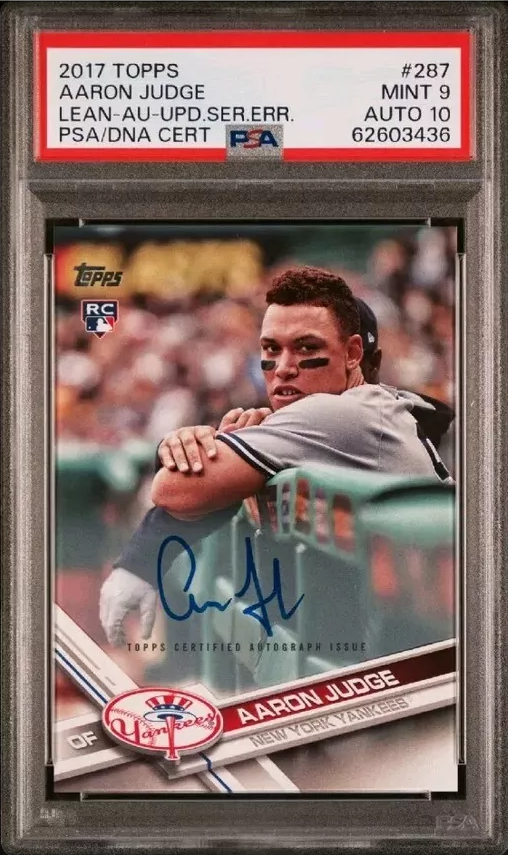 We located this gem, a 2017 Topps Aaron Judge autographed rookie card, #287, graded MINT 9 that purportedly sold for $20,000.
We located this gem, a 2017 Topps Aaron Judge autographed rookie card, #287, graded MINT 9 that purportedly sold for $20,000.
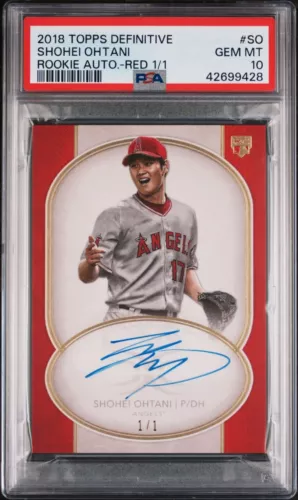 A 2018 Topps Definitive Shohei Ohtani RC Rookie Red TRUE 1/1 AUTO PSA 10 GEM MINT sold for $46,100, after 146 frantic bids.
A 2018 Topps Definitive Shohei Ohtani RC Rookie Red TRUE 1/1 AUTO PSA 10 GEM MINT sold for $46,100, after 146 frantic bids.
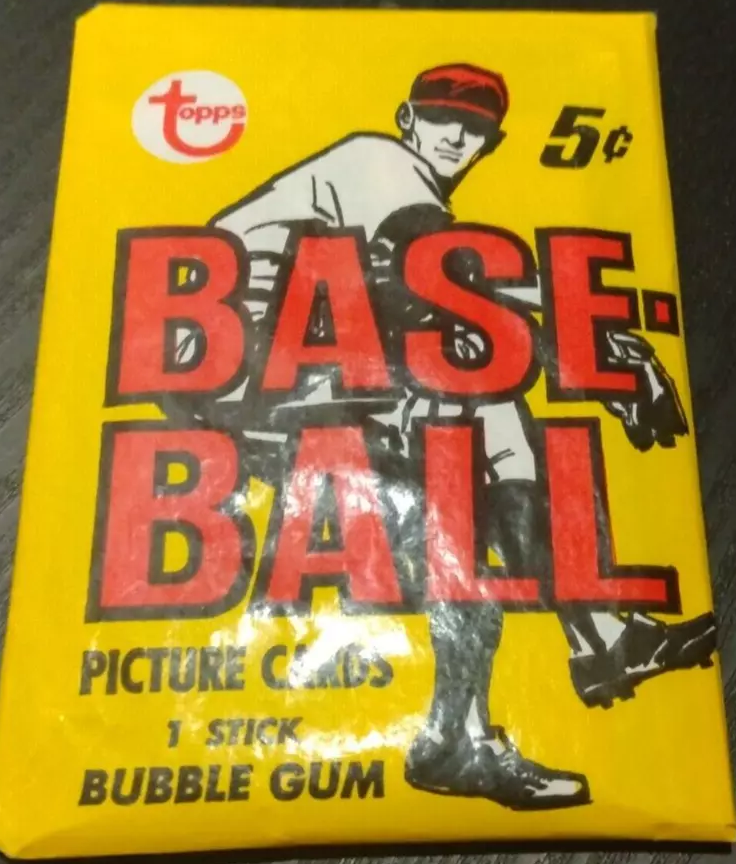 Of course, a 1968 Topps Baseball Wax Pack recently sold for $560, so that's a high risk venture. Check out that price the pack: A nickel. Those were the days. But, think about it. If you paid a nickel back in 1968 and just tossed that pack of cards in your sock drawer, you'd have a mighty fine return on your investment, like well over 1000%. Who needs stocks? Gimme some baseball cards!
Of course, a 1968 Topps Baseball Wax Pack recently sold for $560, so that's a high risk venture. Check out that price the pack: A nickel. Those were the days. But, think about it. If you paid a nickel back in 1968 and just tossed that pack of cards in your sock drawer, you'd have a mighty fine return on your investment, like well over 1000%. Who needs stocks? Gimme some baseball cards!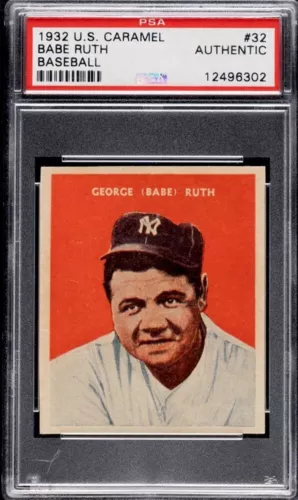
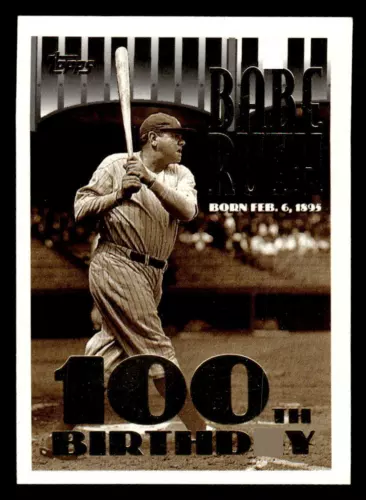 On the other hand, if all you want is a Babe Ruth card, 40 cents gets you a 1995 Topps #3b Babe Ruth like the one shown.
On the other hand, if all you want is a Babe Ruth card, 40 cents gets you a 1995 Topps #3b Babe Ruth like the one shown.